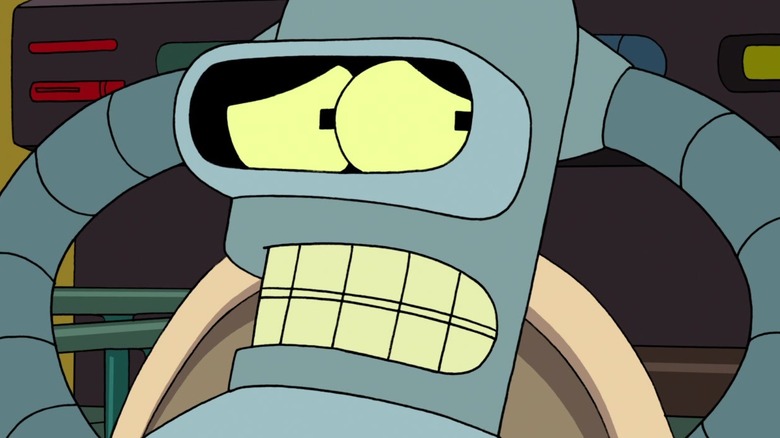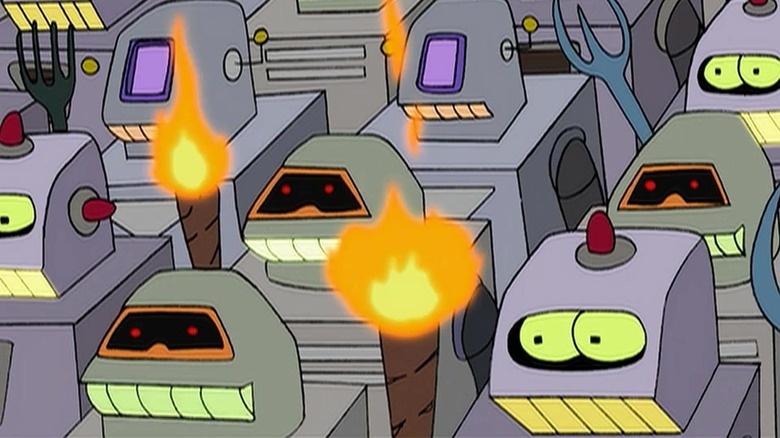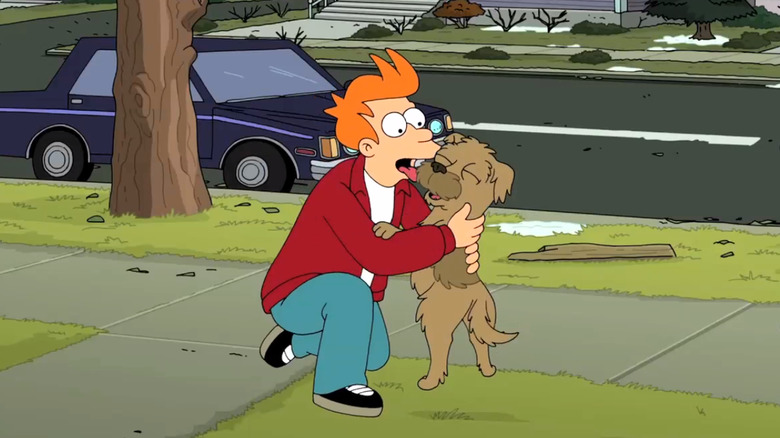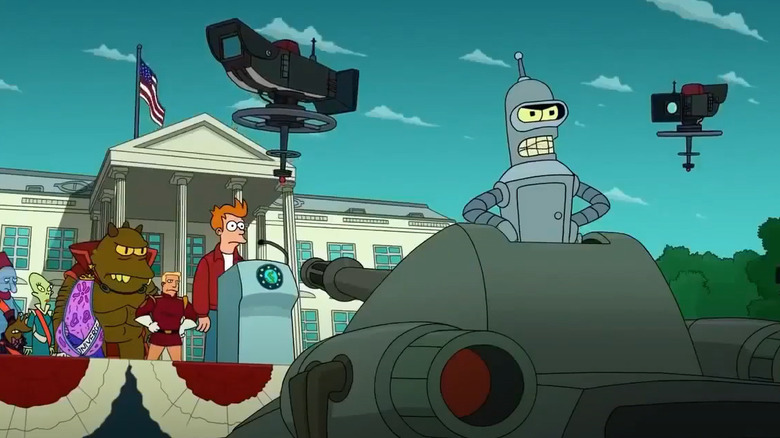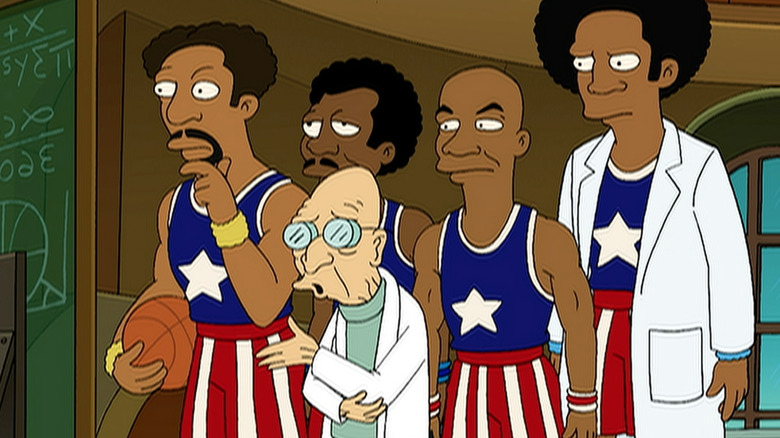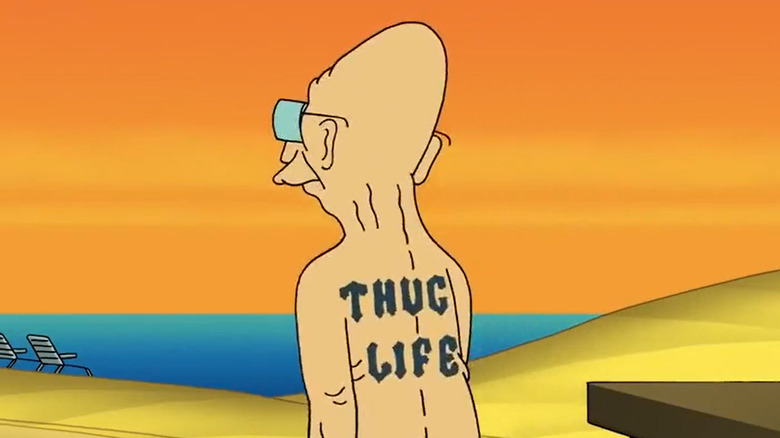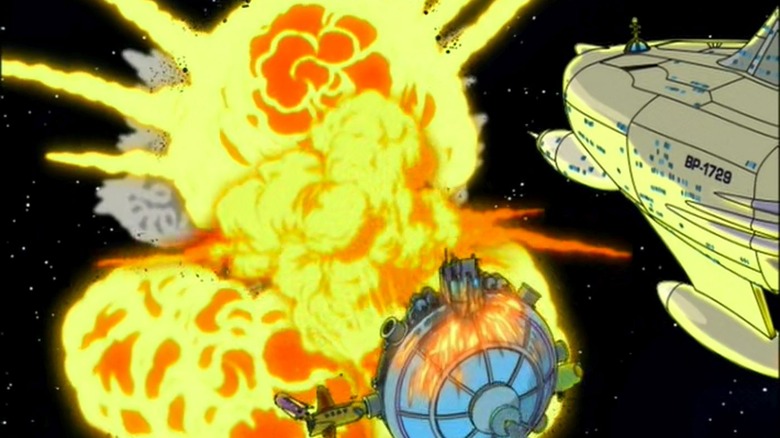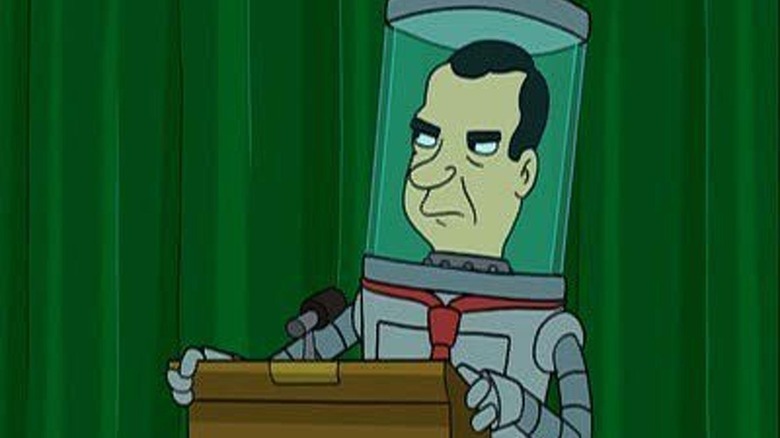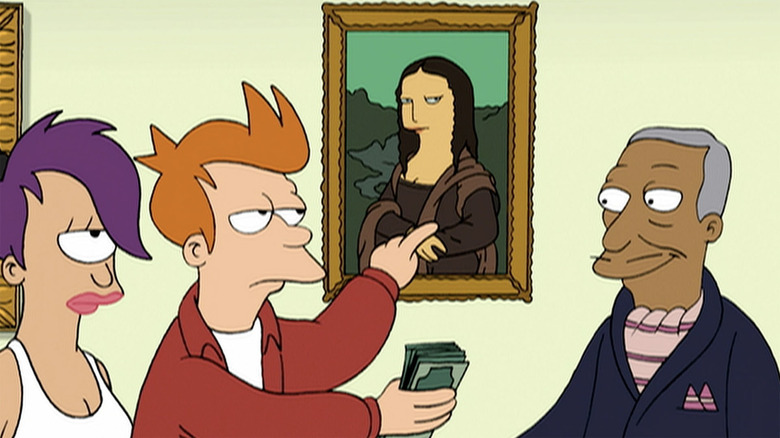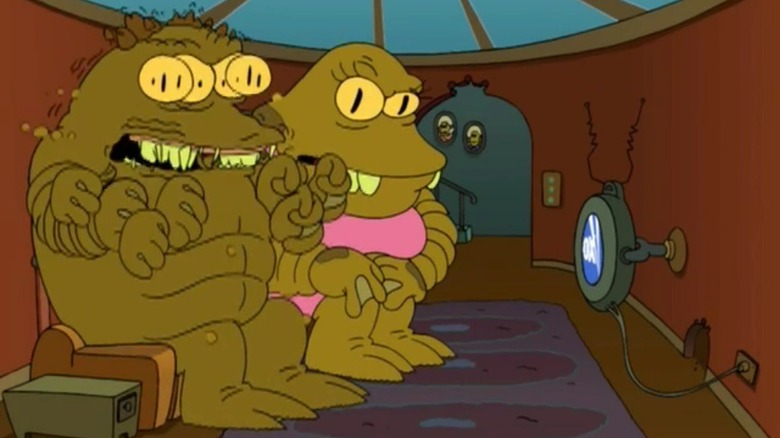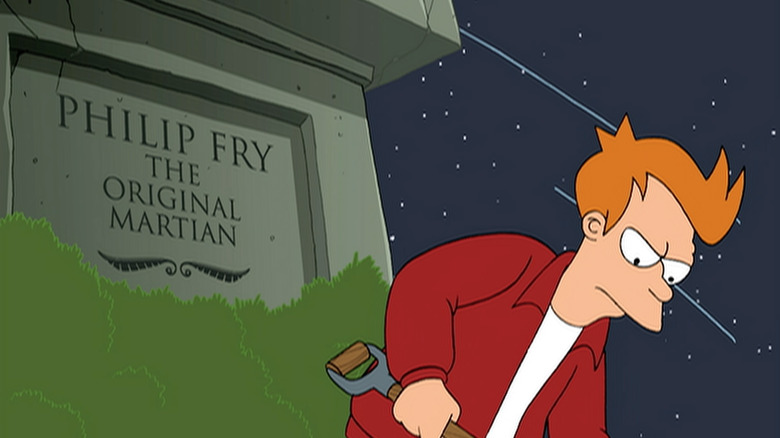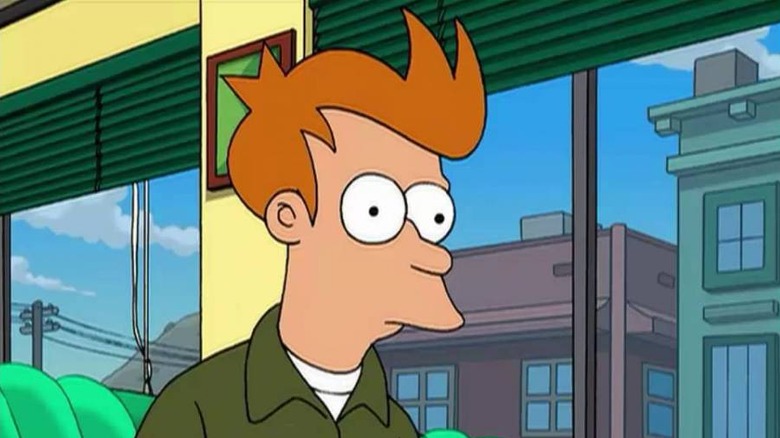Times Futurama Characters Went Too Far
Before we start, let's take a moment to hash out what we mean by "characters going too far." When we say someone or something takes things "too far," we typically mean an act that began in a context of harmless fun has crossed a damaging threshold. The term applies when, for example, a round of playful roughhousing ends in an injury, or a joke escalates until it becomes upsetting. But the rules are different for "Futurama," the sci-fi comedy series that carried on in various forms — a network TV show, a series of direct-to-video films, and a cable TV show — from 1999 to 2013.
In "Futurama," circumstances have only gone "too far" when the Earth explodes, time freezes, or a species of adorable alien babies are mistaken for snack food. We're not suggesting fiascos like the blatantly transphobic Season 4 endeavor "Bend Her" aren't going too far by very reasonable criteria. But these episodes don't include the literal end of the world — they're simply "Futurama" episodes that have aged extremely poorly.
Basically, when someone takes things "too far" in the real world, it's bad. When someone takes things "too far" in the universe inhabited by the Planet Express intergalactic delivery service, the results are typically hilarious, while also being bone-chillingly terrifying for anyone directly involved. Got it? Good! Now, let's explore all the times "Futurama" characters went too far, from straight-up graverobbing to criminal acts of intergalactic warfare.
Bender becomes an inspirational figure in the Death to Humans movement
Lying in order to avoid punishment is an ill-advised but understandable indiscretion. However, when Planet Express' robot ne'er-do-well Bender tells authorities on Chapek 9 that he personally slaughtered a million billion humans to avoid their wrath, he overreaches significantly.
In Season 1's "Fear of a Bot Planet," a delivery to the zealously anti-human Chapek 9 goes south when Bender is arrested for his association with Earth people. Diabolical monster that he is, Bender exaggerates his history of mass murder in order to exploit the population's xenophobia and propel himself to celebrity status. Of course, Bender is a liar who has not killed a million billion humans. Most of the stories about humankind that he tells the gullible mechanical citizens of Chapek 9 are lifted from vampire and werewolf legends. Ultimately, Bender drops the act to rescue his co-worker pals Philip J. Fry and Turanga Leela from execution at the hands of the Council of Robot Elders.
Once the Chapek 9 robots realize that the human Fry and the human-ish Leela have brought a large box of precious lug nuts, they abandon their anti-human bigotry. But if Bender had been left to his own devices, the situation could've gotten way, way out of control.
Bender throws his best friend's dog into a lava pit
If you watch enough "Futurama," you'll notice that Bender goes too far on a routine basis. In fact, if we wanted to, we could make this entire list a collection of Bender-related incidents. But in the interest of variety, we're sticking with the most dramatically awful times Bender pushes the limits of decency. Even within that criteria, there's a lot to choose from — and this is one of the most glaring acts of all.
Season 4's "Jurassic Bark" sits atop many "Best Episodes of Futurama" lists, including ours. It's the heartwarming tale of Fry, the accidental time traveler, discovering the fossilized remains of his 20th century canine companion, Seymour. Ultimately, Fry decides against bringing Seymour back via cloning to join him in the 31st century. However, before Fry comes to that conclusion, Bender throws the fossilized pup into a nearby lava pit in a fit of violent jealousy.
Bender pulls the pooch out of danger once he realizes he's eviscerated Fry's soul by giving into misguided envy. But still, what kind of demented sociopath tries to off a dog with molten lava? Even when you take into account the fact that robots don't have souls, Bender definitely goes too far this time. Side note: Bender also flushes Nibbler town a toilet in Season 2's "I Second That Emotion." If you ever encounter a humanoid robot who sounds like John DiMaggio, keep him away from your pets.
Bender leads an army of robot demons to conquer Heaven
Bender's an amoral kleptomaniac on his good days, but his friendship with Fry makes him look more like a lovable rascal ... most of the time. Sometimes, it just provides Bender with a rationalization for his most overtly supervillain-ish machinations.
At the conclusion of 2008's "Futurama: The Beast With A Billion Backs," Bender resents Fry for spending so much time with Yivo, a space god who is busy romancing every living creature in the universe simultaneously. Outraged, Bender travels to Robot Hell to recruit an army of demon robots to rise up and conquer Earth. The Robot Devil says no dice on an army, unless Bender trades his first-born child — a deal Bender makes quickly and with a nonchalance that strikes even the Robot Devil as cold-blooded.
When Bender springs his unholy invasion, Fry informs him that all living creatures are moving off their planets to live on Yivo's head, which is the basis for humanity's conception of Heaven. Not long after, still missing Fry, Bender leads his army of the damned to raze Heaven. We love our drinking buddies as much as anybody, but if they left us, would we sacrifice our children to Satan and kill God to get them back? To be honest, we think not. Consider chilling out, Bender.
Farnsworth accidentally destabilizes space and time to win a basketball game
When the Harlem Globetrotters fly in from the Globetrotter homeworld to challenge Earth to a basketball game with "nothing at stake" and "no threat beyond the shame of defeat," you wouldn't expect this to bother Professor Hubert J. Farnsworth. As the owner of Planet Express, and therefore directly responsible for the appalling and needless deaths of numerous ex-employees, he should already be completely numb to shame.
But rather than allow a ragtag squad of Earthlings to graciously lose an exhibition game, Farnsworth sends Fry, Leela, and Bender to the far reaches of the galaxy to collect unstable chroniton particles in Season 3's "Time Keeps On Slippin'." Upon their return, he exposes baby mutant supermen to the ominous materials in order to age them into adult monsters within an insanely brief period of time. Farnsworth's reckless, bafflingly unnecessary behavior causes massive damage to the time-space continuum. The linear sequence of events begins flashing forward at unpredictable intervals, imperiling the very matrix of reality.
These time skips provide the basis for Fry and Leela to get married and divorced in a semi-romantic subplot. Meanwhile, Farnsworth and the Globetrotters join forces and eventually figure out a solution. As much fun as it can be to watch Fry suffer, just like winning a basketball game, it certainly isn't worth nearly unmaking all of existence.
Every time Farnsworth gets naked
We're not making a sweeping generalization about the aesthetic value of senior citizens when they don't happen to wear any clothes. We're simply declaring that, due to circumstances specific to him and not necessarily other folks from his demographic, Professor Farnsworth does not make an appealing naked person. Nevertheless, he sheds his clothing quite frequently on "Futurama."
Farnsworth voices his contempt for the 20th century's "primitive notions of modesty" in Season 2's "Xmas Story" shortly before dropping his robe and letting his wrinkly parts bask in the post-climate-apocalypse wintertime heat. In this, and every subsequent occasion in which he disrobes, Professor Farnsworth surely pushes the boundaries of good taste.
But not all Farnsworth-nakedness incidents are terrible. In 2007's "Futurama: Bender's Big Score," we discover Farnsworth has a tattoo that reads "Thug Life" — possibly an ode to rap legend Tupac Shakur (via The Source) — across his back. His nudity in that scene isn't even worth fussing about: Considering this scene takes place on a nude beach planet, plenty of other people share his bare condition at that particular moment.
Zapp Brannigan uses a Hyperdeath ray to cut a ribbon
In this insanely partisan era, plenty of folks can probably relate to Zapp Brannigan's unhinged contempt for the concept of neutrality. What kind of person hasn't picked a side by now? A suspicious person, that's who!
In Season 2's "Brannigan, Begin Again," Zapp's hatred for neutrality spills over into delusional paranoia. The Democratic Order of Planets (DOOP) invites Zapp as the guest of honor at the ribbon-cutting ceremony for the new DOOP headquarters in the Neutral Zone. But when the Planet Express crew arrives to deliver the oversized novelty scissors Zapp needs to perform his ribbon-cutting duties, Zapp arrests them immediately on suspicion of neutrality.
Because committing civil rights violations against the Planet Express crew proves time-consuming and distracting, Zapp decides to save himself a few minutes by using his spaceship's laser — set to "Hyperdeath" mode — to cut the DOOP HQ ribbon from space. And so concludes the brief but noteworthy existence of the new DOOP headquarters.
Zapp's entire presence on "Futurama" depends on him making breathtakingly poor choices that force the folks around him (especially his second-in-command, Kif Kroker) to mop up his messes. But blowing up DOOP HQ for essentially no reason at all is going too far, even with his track record of senseless mayhem.
The head of President Nixon embarks upon a murderous rampage
The version of Richard Nixon who appears in "Futurama" might not be as rotten as the actual 37th president of the United States, but his capacity for destruction is nevertheless impressive.
In Season 2's "A Head in the Polls," Richard Nixon decides to get back in the political game and run for president of Earth. Like many other celebrities and historical figures in the 31st century, Nixon's existence is limited to that of a floating head in a jar, due to the decomposed condition of his erstwhile body. Much of the episode's story revolves around Nixon's technically legal use of Bender's robot body — but once Bender reclaims his torso, arms, and legs, Nixon simply acquires a much larger, Kaiju-sized body equipped with devastating weapons systems.
This Gundam-esque Nixon locks down the robot vote and becomes the new president of Earth. Still, as he puts it, "bitter and, let's face it, crazy" from his infamous near-impeachment and resignation over the Watergate scandal, Nixon embarks upon a rampage of death and destruction throughout the city of Washington D.C. The nation of Earth may never fully recover.
Fry purchases Ted Danson's skeleton
When a man lives his first 20-something years as a dangerously broke pizza delivery technician, he's bound to cut loose if his luck ever swings in the opposite direction. So we understand why Fry shamelessly flaunts his wealth upon discovering the interest generated by his pitiful 20th century bank account has turned him into a 31st century billionaire in Season 1's "A Fishful of Dollars."
Now, some folks argue that displaying the remains of deceased animals around one's abode in the form of taxidermy is in poor taste. According to that criteria, when Fry pays $10,000 at an auction for the skeleton of stalwart television actor Ted Danson, he goes too far, figures out how to go a little further, then goes to that even-further place.
Fry's newfound ocean of cash and pre-existing '90s nostalgia coalesces into a turn of events that introduces the malevolent conglomerate, MomCorp. Danson's bones are only mentioned in a one-off gag — Fry says he needs them because he's got an idea for a sitcom. But the fact that Fry thinks the remains of Ted Danson — a once-living person who had friends, family, hopes, and dreams — warrants so little reverence tells us exactly how far down the rabbit hole of depravity he has fallen.
Lrrr orders his troops to go full Independence Day over Ally McBeal
Seeing as how this is a website by and for pop culture fanatics, we generally feel tremendous sympathy for folks who miss out on the finale of their favorite show. But when Lrrr, the sovereign ruler of Omicron Persei 8, orders the invasion of Earth after a technical glitch prevents him from seeing the "Single Female Lawyer" season finale, that's an overreaction we would describe as "too far."
The trajectory of events depicted in Season 1's "When Aliens Attack" is set in motion before the opening credits. As Fry often ends up at the center of universe-altering events in "Futurama," it tracks that he was the person who spilled beer on the late-'90s Fox affiliate control panel, which cuts off the broadcast Omicronians are watching 1,000 light years away. To extract his revenge and enforce his will, Lrrr swoops down to Earth and immediately destroys the Eiffel Tower, the Great Sphinx of Giza, the Leaning Tower of Pisa, and other prominent Earth landmarks. The fact that they all happen to be located on the same beach in New New York, thanks to the state's former supervillain governor, allows Lrrr to enact his senseless annihilation of irreplaceable human history much more quickly than the comparable alien invasion depicted in "Independence Day." Lrrr gets to see his program by the episode's end, but did it really have to come at such an amusing cost?
Fry, Leela, and Bender rob the grave of Fry's nephew
Over time, societies change, and behaviors one era considers taboo might be acceptable during another. But there are some practices for which the consensus disdain appears to be unshakable. Graverobbing definitely belongs in that category, especially if that grave belongs to a family member. In Season 3's "The Luck of the Fryrish," Fry is horrified to discover a 21st century man named Philip J. Fry who looks just like him took possession of his long-lost seven-leaf clover and consequently became a globally-famous astronaut and rock star.
Fry assumes this paragon of human achievement must be his brother Yancy, who would've had access to the clover and knowledge of its supernatural powers. While in the process of digging up what he thinks is his elder sibling's corpse, Fry notices the gravestone's inscription: "Here Lies Philip J. Fry, named for his uncle, to carry on his spirit." This happens just in time for Bender to break open the coffin and snag the lucky clover.
It's an embarrassing mix-up, to be sure, but it's also a lesson to the rest of us that graverobbing is always going too far. Although, as far as "Futurama" goes, perhaps robbing celebrity graves should be judged differently. If your victim still lives — even as a head in a jar — then graverobbing feels more like conventional robbery ... even if the stolen goods are, technically, lifted from a grave.
Fry goes back in time and becomes his own grandfather
Fry transgresses the boundaries of decency in a whole new way in Season 3's "Roswell That Ends Well." Our red-headed protagonist accidentally sends the Planet Express ship back to the 1940s, where it crashes in Roswell, New Mexico. During his relatively short time in the past, Fry manages to accidentally murder his grandfather, deliberately sleep with his grandmother, and accidentally impregnate her with the fetus that eventually becomes Fry's father, Yancy Fry Sr.
Using time travel to become your own grandfather? Well, as a beloved character from a different animated series aimed at adults might say, "That's too much, man." The events of this episode reverberate throughout the mythology of "Futurama." In fact, Fry's status as his own grandfather is — unbeknownst to him and all the other characters, except for Nibbler — the real reason why he's in the future in the first place. But that's a story for another list. For now, simply contemplate the inherent too-far-ness of the fact that Fry could send a Grandparents' Day card to himself.
